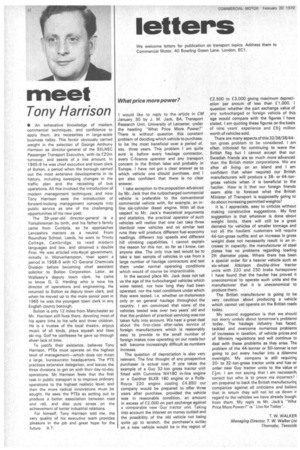meet
Page 34

If you've noticed an error in this article please click here to report it so we can fix it.
Tony Harrison
• An exhaustive knowledge of modern commercial techniques, and confidence to apply them, are necessities in large-scale business today. This factor obviously carried weight in the selection of George Anthony Harrison as director-general of the SELNEC Passenger Transport Executive, with its £20m turnover, and assets of a like amount. In 1965-9 he was chief executive and town clerk of Bolton, a period when the borough carried out the most extensive developments in its history, including sweeping changes in the traffic plan and the recasting of bus operations. All this involved the introduction of modern management techniques, and now Tony Harrison sees the introduction of forward-looking management concepts into public service as one of the challenging opportunities of his new post.
The 39-year-old director-general is a Yorkshireman by birth, and his father's family came from Cumbria, so he approaches Lancashire matters as a neutral. From Roundhay School, Leeds, he went to Trinity College, Cambridge, to read modern languages and law, and obtained a double First. He was articled into +local government, initially in Wolverhampton, then spent a period in 1958-9 with ICI General Chemicals Division before becoming chief assistant solicitor to Bolton Corporation. Later, as Wallasey's deputy town clerk, he came to know G. G. Harding who is now his director of operations and engineering. He returned to Bolton as deputy town clerk, and when he moved up to the more senior post in 1965 he was the youngest town clerk in any English county borough.
Bolton is only 12 miles from Manchester so Mr. Harrison still lives there, devoting most of his spare time to his wife and three children. He is a trustee of the local theatre, enjoys music of all kinds, plays squash and likes ski-ing. Golf he confesses he gave up through sheer lack of time.
To justify their existence, believes Tony Harrison, PTEs must operate on the highest level of management—which does not mean a large, bureaucratic headquarters. The PTE practises extensive delegation, and leaves the three divisions to get on with their day-to-day operations. Mr. Harrison feels that the first task in public transport is to improve ordinary operations to the highest realistic level; and then the more radical innovations must be sought. He sees the PTEs as setting out to produce a better association between road and rail, and also puts stress on the achievement of better industrial relations.
For himself, Tony Harrison told me, the very quality of his executive team provides pleasure in the job and great hope for the future. A.T.














































































































































































































